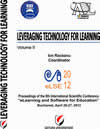TRENDS AND DEVELOPMENTS IN LIFE LONG LEARNING SYSTEMS
TRENDS AND DEVELOPMENTS IN LIFE LONG LEARNING SYSTEMS
Author(s): Maria AndronieSubject(s): Education
Published by: Carol I National Defence University Publishing House
Keywords: e-learning; information technology; multimedia; communication technologies
Summary/Abstract: Lifelong learning programs are more and more a necessity than an option in today’s increasingly dynamic information society. Now, for an employed person to have a successful career, in order to maintain or improve his position, regardless of the industry he is working in, it is not any more enough to finish university studies at a reputable learning institution. Taking into account the increasing rate of the changes we are witnessing, it becomes more and more important for that person to continue the studies after graduating, for the rest of the active career, this being the only reasonable way one can keep up to date with all the technological advances that are taking place. Until recently the access to learning resources was limited to those who had the time to attend classical study programs such as those offered by universities, spending considerable time and effort to learn using traditional means, usually in campuses. The rapid changes brought by technology advances came also with advantages that past generations did not benefit from. Today, with the emergence of multimedia and communication technologies, the concept of lifelong learning has become virtually applicable to all those interested in developing their own career. The widespread use of computers and communication technologies has caused the emergence of new ways to provide support and information to those who want to learn from a distance. Now, more than ever before, for a student it is possible to study without being at the same place in the same time with the teacher, having comparable or even better results than those studying in the traditional manner.
Journal: Conference proceedings of »eLearning and Software for Education« (eLSE)
- Issue Year: 8/2012
- Issue No: 02
- Page Range: 22-26
- Page Count: 5
- Language: English

